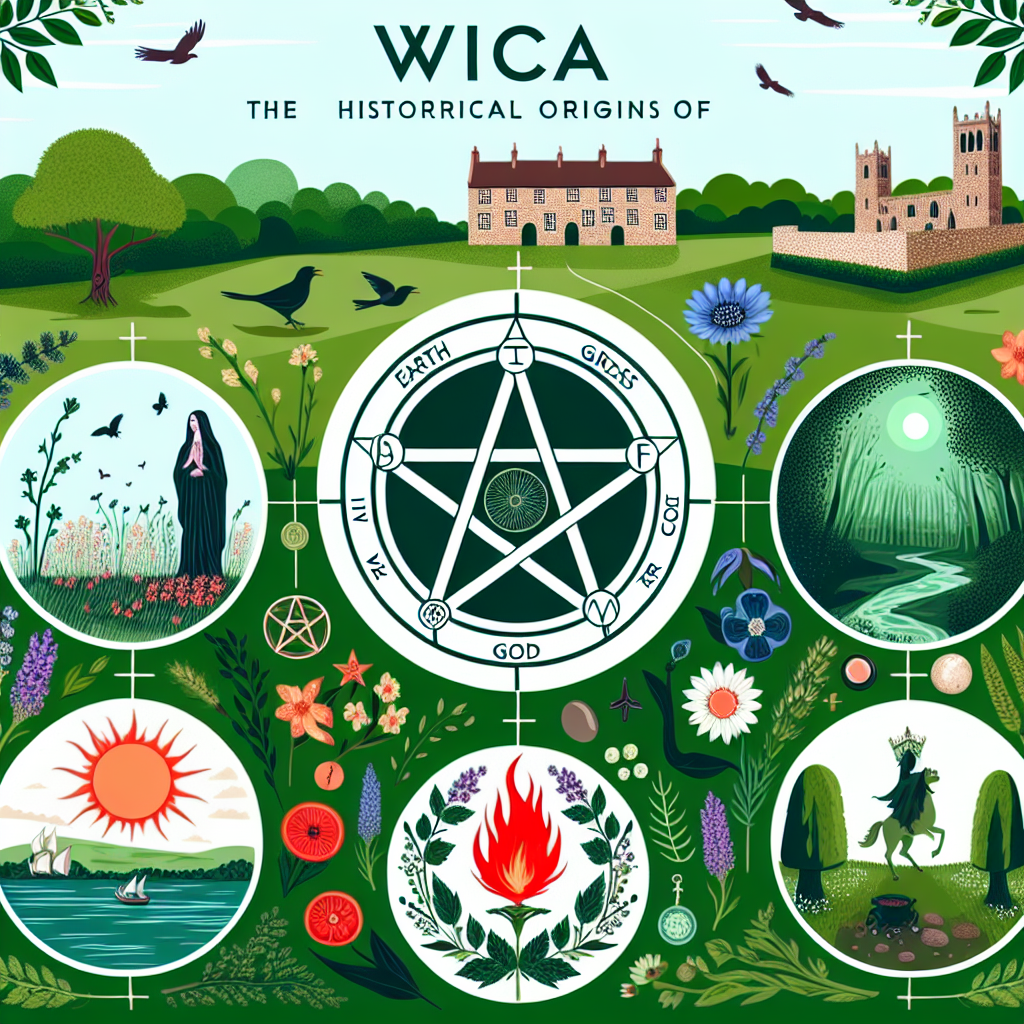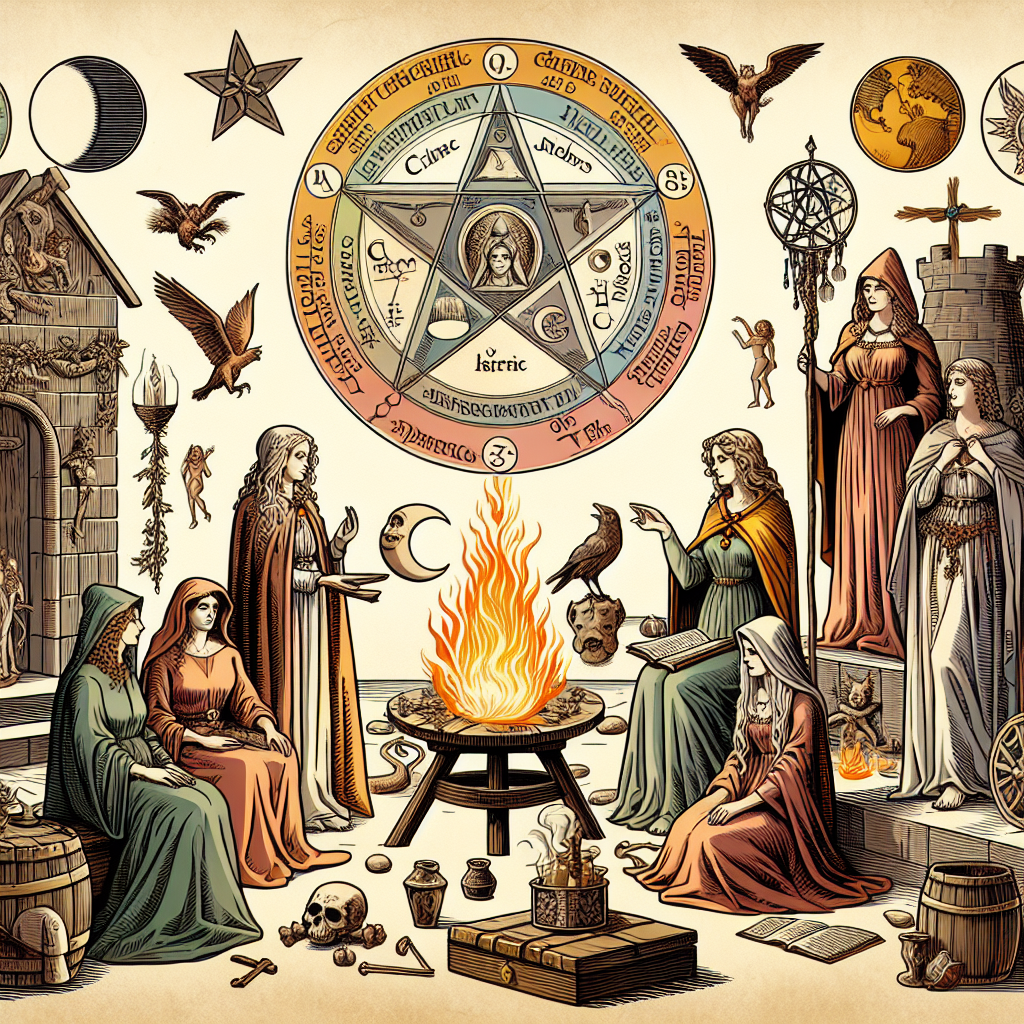As an Amazon Associate I earn from qualifying purchases.

Wicca, a modern Pagan religion that celebrates nature, emerged in the mid-20th century, but its roots trace back to pre-Christian spiritual practices. This earth-based religion harnesses the cycles of nature and the universe into its core belief system and emphasizes the divinity present within all living beings. It is unique among religions in that it lacks a centralized authority or a single holy book, instead, it is defined by its fluid practices and beliefs that can be personalized by its adherents.
The history of Wicca as a formalized religion dates back to the 1940s and 1950s, particularly in England with the works and practices of Gerald Gardner, a retired British civil servant and amateur anthropologist. Gardner claimed that he had been initiated into a surviving coven of witches in the New Forest region of England, and that this cabbalistic group preserved ancient Pagan practices. Gardner's writings and the traditions he propagated became known as Gardnerian Wicca, which is acknowledged as the foundation upon which much of modern Wicca is built.
As Wicca evolved, it incorporated elements from various sources, including Western ceremonial magic, the mythologies of pre-Christian Europe, the Kabbalah, and the writings of occultists like Aleister Crowley. Additional branches and traditions emerged, notably Alexandrian Wicca founded by Alex Sanders and Dianic Wicca which emphasized the divine feminine, often to the exclusion of male deities. These various strands contributed to a rich, albeit decentralized, tapestry of Wiccan practice.
One fascinating aspect of Wicca is its representation in popular media and culture, which has influenced public perception and awareness. Estimates suggest there are hundreds of thousands of Wiccans around the world today, with the religion enjoying particular popularity in the United States and the United Kingdom. The growth of the Internet has also played a significant role in the dissemination of Wiccan beliefs and practices, enabling solitary practitioners and remote covens to connect and share their experiences expanding the reach of the Wiccan community.
An embracing of gender equality and environmental activism is increasingly aligning Wicca with contemporary societal values. The fluidity of Wicca allows it to be adapted to the personal spiritual needs of individuals, while its foundational reverence for nature has positioned it at the forefront of religious movements advocating for sustainability and ecological preservation. As the world grapples with the challenges of climate change and the search for personal spiritual meaning, Wicca's adaptable and planet-centered approach allows it to continually evolve within the religious landscape.
`
Exploring the Roots of Wicca: Uncovering the Historical Origins and Development of This Modern Pagan Path
`
Wicca is a contemporary spiritual path rooted in the ancient traditions of witchcraft and paganism. Emerging prominently in the mid-20th century through the influential work of Gerald Gardner, it draws from older esoteric philosophies and ritual magick practices. As a nature-based religion, Wicca venerates the divine as manifest in the Goddess and the God, embodying a duality in creative force and spirituality. At its core, Wiccan belief embraces the cycle of the seasons, the sacredness of life, and the interconnectedness of all things. This article delves into the intricate tapestry of Wicca’s origins, tracing its evolution from the early perceptions of pre-Christianity folk rites to its current standing as a recognized spiritual movement. Join us as we unravel the rich tapestry of Wiccan history and its place in the modern spiritual landscape.
Wicca is a modern Pagan religion that emerged in the early 20th century, with its roots deeply entwined with Western esoteric traditions and ancient pagan beliefs. The foundation of Wicca as we know it today was laid down in the 1940s and 1950s by a British civil servant named Gerald Brosseau Gardner. Gardner is often credited as the “Father of Wicca” for his pivotal role in bringing the religion into the public eye. He claimed to have been initiated into a coven of witches in the New Forest area in England, and from there, he drew inspiration to formulate the Wiccan belief system and its practices.
**Origins of Wicca**
In determining where did Wicca come from, one must consider the eclecticism at Wicca's core. Wicca draws from a variety of sources including, but not limited to, pre-Christian pagan religions, ceremonial magic, Eastern philosophy, and 19th-century occultism. The reviving interest in such disciplines, particularly in the late 1800s and early 1900s with figures like Aleister Crowley and the Hermetic Order of the Golden Dawn, significantly influenced Wicca's doctrines. Gardner himself was an initiate of the Rosicrucian Order and had a keen interest in the occult and the writings of Aleister Crowley.
**Influence of Margaret Murray**
Another notable influence on Wicca's origins was the work of Margaret Murray, an Egyptologist and anthropologist. In her controversial book, “The Witch-Cult in Western Europe,” published in 1921, she posited the existence of a pan-European witch-cult that had survived in secret for centuries. Although her theories have been largely disproven by historians, they provided an appealing narrative for those looking to reconnect with pre-Christian spiritual systems and greatly influenced Gardner’s formulation of Wicca.
**Evolution of Wiccan Traditions**
Gardner’s Wicca was initially referred to as Gardnerian Wicca, and it emphasized the worship of a Goddess and a God, ritual practices, seasonal festivals known as Sabbats, and rites marking the phases of the moon referred to as Esbats. From Gardnerian Wicca branched out several other traditions as different practitioners interpreted the belief system in their own ways. An influential figure in this diversification was Alex Sanders, who, in the 1960s, founded what would become known as Alexandrian Wicca, another prominent tradition.
The 1970s saw a surge of interest in Wicca and related neo-pagan practices, particularly in the United States. During this time, a movement towards a more solitary practice of Wicca also took shape with the release of books such as “Witchcraft for Tomorrow” by Doreen Valiente, a former High Priestess in Gardner's coven, and “Wicca: A Guide for the Solitary Practitioner” by Scott Cunningham, which provided a framework for individuals to practice Wicca on their own without needing to join a coven.
**Contemporary Wicca**
Today, Wicca has continued to evolve, with a variety of strands and traditions reflecting the diversity of its practitioners' beliefs and practices. The internet has helped to spread Wiccan thought and foster connections among practitioners worldwide. Some adhere strictly to traditional lineages and covens, while others adopt a more syncretic and eclectic approach, integrating elements from different spiritual paths. Environmental sustainability and the veneration of nature have also become central to many modern Wiccan practices.
Despite its relatively short history, the number of adherents to Wicca has grown significantly over the past several decades. A study by the Pew Research Center in 2014 estimated that 0.4% of Americans, approximately 1.5 million people, identify as Wiccan or Pagan, showcasing the substantial growth and spread of this modern religious movement since its inception.
In conclusion, (content removed as per instructions).
“`html
1. What is Wicca?
Wicca is a modern Pagan religion that draws upon a diverse set of ancient pagan beliefs, symbols, and practices, as well as 20th-century hermetic motifs. It is characterized by its veneration of nature, use of magic, and worship of a goddess and often a god.
2. Who founded Wicca?
Wicca was founded in the mid-20th century by Gerald Gardner, a retired British civil servant, and an amateur anthropologist and archaeologist. He claimed to have been initiated into a coven of witches in the New Forest region of England and to have received permission to bring their practices to the public.
3. Are Wicca and witchcraft the same thing?
While Wicca does involve practices commonly associated with witchcraft, such as spell casting and rituals, not all witches identify as Wiccan, and not all Wiccans would describe their practices as witchcraft. Wicca is a specific religion with its own set of beliefs and practices, while witchcraft can be a practice independent of any religious affiliation.
4. Is Wicca based on ancient pagan religions?
Wicca is inspired by ancient pagan religions, but it is not a direct continuation of any one tradition. Instead, it synthesizes elements from various pagan practices along with 19th and 20th-century esoteric philosophies and ceremonial magic traditions.
5. Does Wicca involve a belief in deities?
Yes, Wicca typically involves the worship of at least two deities: a goddess and a god, who are sometimes viewed as aspects of a greater pantheistic spirit. Some traditions may honor a specific pantheon of gods and goddesses.
6. What are some of the core principles of Wicca?
Core principles of Wicca often include the Wiccan Rede (“An' it harm none, do what ye will”), the Law of Threefold Return (the belief that whatever one puts out into the world, positive or negative, will be returned threefold), and a deep reverence for nature.
7. How is Wicca practiced today?
Wicca is practiced both by individuals and by groups, known as covens. Practices may include rituals, spell-casting, celebration of seasonal festivals (Sabbats), and moon observances (Esbats). Many Wiccans also practice divination, meditation, and personal development.
8. Are there different traditions within Wicca?
Yes, there are many different traditions within Wicca, such as Gardnerian, Alexandrian, and Dianic, each with its own specific practices, rituals, and beliefs. Some Wiccans follow eclectic paths, drawing from various traditions or creating their own personalized practice.
9. How do people become Wiccan?
People can become Wiccan by studying Wiccan beliefs, participating in rituals, and often undergoing an initiation process, either through self-initiation or by being initiated into a coven. Reading books, attending workshops, and engaging with the Wiccan community can also help one to learn more about the religion.
10. Is there a sacred text in Wicca?
There is no single sacred text that all Wiccans adhere to. Many Wiccans draw from a variety of sources including Gardner's writings, traditional folklore, and the rituals and teachings of their particular tradition or lineage. Some also value the “Book of Shadows,” which is a collection of spells, rituals, and teachings that can be personal to an individual or shared within a coven.
“`
Conclusion
The origins of Wicca can be traced back to the first half of the 20th century, with Gerald Gardner being instrumental in its inception and popularization. The movement combined elements of ceremonial magic with an earth-based spirituality, drawing from various esoteric traditions as well as the older pagan beliefs of pre-Christian Europe. The foundational text for Wicca was Gardner's “Witchcraft Today,” published in 1954, which served to codify the Wiccan belief system and rituals. Over the years, Wicca evolved into an established religion, branching into various traditions such as Alexandrian and Dianic Wicca, each with its unique rituals and practices but all adhering to the core principles of reverence for nature, the God and Goddess, and the Wiccan Rede.
As Wicca progressed into the 21st century, it continued to adapt, showing a remarkable level of flexibility and resilience. In contemporary times, the practice has embraced solitary practitioners who interpret Wiccan tenets in personal and eclectic ways, as well as the concept of self-initiation. Similarly, the Internet has played a vital role in its expansion, enabling the dissemination of Wiccan knowledge and connecting a global community of followers. Despite its relatively modern origins, Wicca now boasts a diverse spectrum of adherents, confirming its status as a dynamic and continuously evolving path that resonates with many in search of spirituality intertwined with nature and personal empowerment.
Amazon and the Amazon logo are trademarks of Amazon.com, Inc, or its affiliates.


